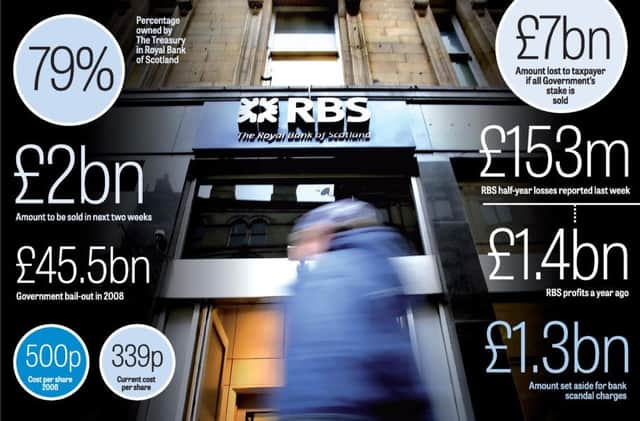Osborne gives green light to RBS sale


The sale represents a significant step towards the return of the UK banking system to normality following the credit crunch but could come at a considerable cost to the taxpayer.
A report from investment bank Rothschild has previously suggested at their current price the shares will be sold at a £7 billion loss.
Advertisement
Hide AdAdvertisement
Hide AdHowever, UK Financial Investments (UKFI), the body which manages the Government’s shareholdings in banks following the credit crunch, believes the share price will rise as the company’s health improves and shares are returned to the market.
In a speech earlier this year, Mr Osborne signalled his intention to begin the sale of RBS shares despite the price remaining below that paid seven years ago.
He pointed to advice from Bank of England governor Mark Carney that delaying the sale would pose a risk to the taxpayer while going ahead would “promote financial stability, a more competitive banking sector, and the interests of the wider economy”.
A Treasury spokesman said tonight: “UK Financial Investments today advised the Chancellor it would be appropriate to conduct the first sale of the government’s shareholding in the Royal Bank of Scotland.
Advertisement
Hide AdAdvertisement
Hide Ad“The Chancellor agrees with that advice and has authorised the process to begin.
“The government set out its objectives for its shareholdings in the banks in the Chancellor’s annual Mansion House speech in June 2013 – getting the best value for the taxpayer, maximising support for the economy and restoring them to private ownership – and as set out in that address, the government will only conclude a sale if these objectives are met.”
The then Labour government bailed out RBS at a cost of £45.5bn in 2008, paying around 500p per share. Shares closed yesterday at £337.50.
Shadow Chancellor Chris Leslie questioned the Government’s haste to dispose of its RBS stake.
Advertisement
Hide AdAdvertisement
Hide AdHe said: “Taxpayers want their money back and I just don’t believe this is an impossible objective.
“Why this rush to sell when the share price is so far below that paid at the time of the rescue? RBS had to be bailed out urgently, but it doesn’t have to be sold off at the same speed.”
Last week RBS posted half-year losses of £153 million against profits of £1.4 billion a year ago. The bank had to set aside £1.3 billion for bank scandal charges and Chief executive Ross McEwan cautioned of more pain to come.
The bank faces further fines for ‘’conduct issues of the past’’, with RBS braced for settlement costs in the US related to mortgage backed securities, which have battered many of its rivals in America over the past couple of years.
Advertisement
Hide AdAdvertisement
Hide AdMr McEwan said: “This year will continue to be a noisy year as we go further and faster with restructuring and with all the conduct issues of the past.’’
In a separate move today, the Government continued to reduce its stake in Lloyds Banking Group, another hangover from the credit crunch.
The latest sale of shares reduced the Government’s holding to 14 per cent of the business with the process so far raising £14 billion which has been used to pay off national debt.
Mr Osborne said: “It’s fantastic news that we’ve sold more shares in Lloyds Bank, taking the total recovered to almost £14 billion.
Advertisement
Hide AdAdvertisement
Hide Ad“I am determined to build on this success, and to continue to return Lloyds to the private sector and reduce our national debt.”
The Government began selling Lloyds shares last December and will completely dispose of its stake by the end of the year.